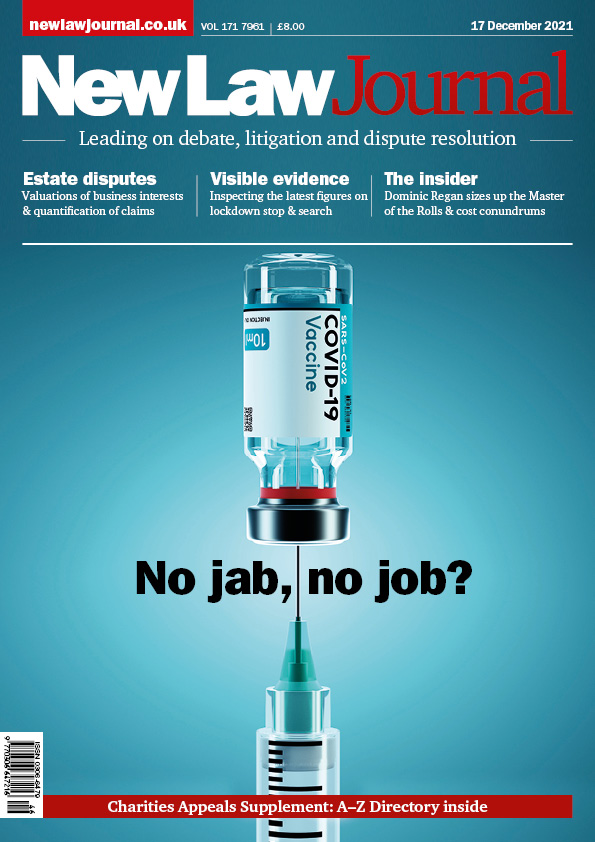THIS ISSUE

Rakesh Kapila explains how forensic accountants can help when disputes arise from the administration of estates
Sarah Rushton & Sophie Georgiou address the thorny issue of vaccine mandates in the workplace
Andrew Wilkinson considers the implications of Hirachand v Hirachand for lawyers & probate practitioners
Feeling starstruck? Dominic Regan sizes up the Master of the Rolls & takes shelter from recent grenades tossed into the world of costs management
Peter Mansfield reveals the shocking truth about a popular Christmas film
Neil Parpworth interprets the latest Home Office figures on stop and search
Kim Beatson & Victoria Brown return to discuss what happens after a fact finding hearing, Scott Schedules and recent case law
The number of solicitors working in-house has risen ‘significantly’ in the past decade, amid a UK-wide boost in legal services output
Professor Dominic Regan explains why he is ‘smitten’ by the Master of the Rolls, Sir Geoffrey Vos, in this week’s NLJ
MOVERS & SHAKERS

Jurit LLP—Caroline Williams
Private wealth and tax team welcomes cross-border specialist as consultant
.tmb-mov69x69.jpg?sfvrsn=961ae4db_1)
HFW—Simon Petch
Global shipping practice expands with experienced ship finance partner hire
95ca96e3d47f4eff8d147c4f0df17c77.tmb-mov69x69.png?sfvrsn=3db5d86b_1)
Freeths—Richard Lockhart
Infrastructure specialist joins as partner in Glasgow office
NEWS
Talk of a reserved ‘Welsh seat’ on the Supreme Court is misplaced. In NLJ this week, Professor Graham Zellick KC explains that the Constitutional Reform Act treats ‘England and Wales’ as one jurisdiction, with no statutory Welsh slot
The government’s plan to curb jury trials has sparked ‘jury furore’. Writing in NLJ this week, David Locke, partner at Hill Dickinson, says the rationale is ‘grossly inadequate’
A year after the $1.5bn Bybit heist, crypto fraud is booming—but so is recovery. Writing in NLJ this week, Neil Holloway, founder and CEO of M2 Recovery, warns that scams hit at least $14bn in 2025, fuelled by ‘pig butchering’ cons and AI deepfakes
After Woodcock confirmed no general duty to warn, debate turns to the criminal law. Writing in NLJ this week, Charles Davey of The Barrister Group urges revival of misprision or a modern equivalent
Family courts are tightening control of expert evidence. Writing in NLJ this week, Dr Chris Pamplin says there is ‘no automatic right’ to call experts; attendance must be ‘necessary in the interests of justice’ under FPR Pt 25






